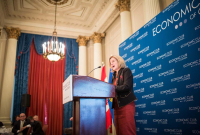Support strong Canadian climate journalism for 2025
Montreal-based poet Erin Robinsong and Vancouver-based author Seth Klein shared their visions for the collective fight against the climate crisis. Robinsong’s was refracted through her poetry, while Klein’s was through a discussion of his new book A Good War: Mobilizing Canada For The Climate Emergency.
“Is the economy as strong as ever? Is policy as unstoppable as fire? We could elect the climate to power, since it already is in power, in power, in power, in power,” read Robinsong from her poem “Members of Weather,” which she rewrote for the virtual event, as part of Conversations, sponsored by Canada's National Observer.
Minutes later, Klein was laying out his four markers of an emergency based on Canada’s mobilization during World War II: spending whatever it takes to win, creating new economic institutions, moving from incentive-based policies to mandatory measures, and telling the truth.
Canada, said Klein, isn’t doing any of them.
“Why don’t our leaders, including environmental leaders, spend what it takes to win, create new crown corporations, and use the regulatory power of the state to require change? Because 40 years of neoliberalism have told them those things aren’t allowed or practical anymore. We need to bust out of the straitjacket of those assumptions,” said Klein.
Hosted by Canada’s National Observer founder and editor-in-chief Linda Solomon Wood, the hour-long event delved into Klein’s book, which compares our response to the climate crisis with Canada’s nation-wide social and economic restructuring during the Second World War. Klein argues that this period offers supporting evidence for a similar approach to the climate crisis, which he said is the greatest existential threat since Nazi Germany.
Klein explained that similar to the fight against the climate crisis, popular support for war measures wasn’t achieved overnight.
“The early mobilization and recruitment efforts in Canada were weak when we asked the public to go after these bad guys on the other side of the world,” said Klein. “People signed up, but not in the numbers required. What they realized is that if they were actually going to achieve the mobilization and enlistment numbers that they wanted to hit, they had to engage Canadians in a conversation about what kind of society they would come back to.”
Klein said this process spurred income transfer programs, unemployment insurance, family allowances, and tax increases on the wealthy and corporations. “The whole architecture for the post-war welfare state is written during the war, and offered up to Canadians as a pledge that the country they will come back to will look different and more just than the one they were leaving behind,” said Klein.
“That’s when you get the mobilization.”
This historical reality suggests a similar approach could propel an appetite for aggressive climate policy.
“All of that has an echo in the present appeal of the Green New Deal today,” said Klein. “When you link the fight on climate with tackling inequality, the support for mobilization on climate doesn’t go down. It goes through the roof.”
Klein also argued the wartime practice of creating Crown corporations to kickstart newly required enterprise was critical in Canada’s success.
“Imagine a new generation of crown corporations to mass produce… solar arrays, wind farms, electric busses, heat pumps. Get the profits out of it, bring the price down, have an army of installers who come into our homes, make it easy, and we can start to imagine what this could look like at scale.”
But Klein noted that provincial and federal governments which practice “new climate denialism” pose a challenge to this sort of mobilization. These governments “don’t deny the climate science,” said Klein, but rather “accept the climate science and then pursue a policy agenda that is incongruous with what the science says we have to do.”
“Why aren’t our leaders being bolder?” he posed.
But hope was found in both Klein’s words and Robinsong’s prose. Reading from her poem “Late Prayer” to open the event, Robinsong recited, “Let our joy repeated be power that spreads. May our wealth be common. May oligarchs come out of their fortresses and become psychologically well. May their wealth be returned to the people and places.”
Klein, closing the event, spoke of the connectivity required to fight climate change: “The things we have been called upon to do in this pandemic are anathema to all of our social urgings. The good news is that the things we are called upon now to do in response to the climate emergency are precisely the opposite. Let’s go out and do something grand together. We can do that for a few years.”






Comments